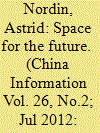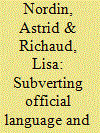| Srl | Item |
| 1 |
ID:
113704


|
|
|
|
|
| Publication |
2012.
|
| Summary/Abstract |
China's modernization and rise is commonly understood as a key factor that will shape future world order. This article examines narratives at Expo 2010 Shanghai China as an instance of the local constitution of this future world. Such imaginations of China and/in the world actively create the future, through assumptions about time and space that structure the possible imaginations of China, the World, and their interrelation. This article examines how the technological and conceptual innovations that play out at the Expo draw on two common cosmologies, the 'unit-based' cosmology of the international state system and a Chinese 'holistic' imaginary of tianxia (all-under-heaven). It shows how these two cosmologies order universal/particular, time/space, and self/other through Beijing's 'harmonious world' policy. It argues that the two cosmologies are not mutually exclusive, but are deployed at the Expo in ways that reinforce one another by ordering spatial difference through teleological time. The effect is a story of China and the World where others are not different; they are just behind. This is a problem because the reduction of spatial difference to place in a historical queue makes it difficult to imagine plural futures, as opposed to The Future already inscribed in the story.
|
|
|
|
|
|
|
|
|
|
|
|
|
|
|
|
| 2 |
ID:
129805


|
|
|
|
|
| Publication |
2014.
|
| Summary/Abstract |
While the promotion of 'harmony' (??) in Chinese official discourse is widely regarded as a feature of state propaganda and censorship, scarce attention has been paid to the reception and redeployment of such language among Chinese citizens. The often creative and ironic reappropriation of official language in everyday speech practices, both on the Internet and in conversations with peers, is an important aspect of Chinese language/politics and deserves careful examination. Much of the current work has regarded these discursive practices in terms of a resistance to 'harmonization' or, following a Bakhtinian reading, as 'carnival'. We argue that such approaches do not fully take into consideration actors' actual experience of consuming and producing such language play. Based on semi-structured interviews with Chinese university students conducted in 2009-11, this article shifts away from the dominant assumptions about the role of ironic reiterations of official language, in order to highlight how the presumed repoliticization of these linguistic practices also involves a depoliticization, reflecting the complexity and ambiguity of the relationships they negotiate.
|
|
|
|
|
|
|
|
|
|
|
|
|
|
|
|